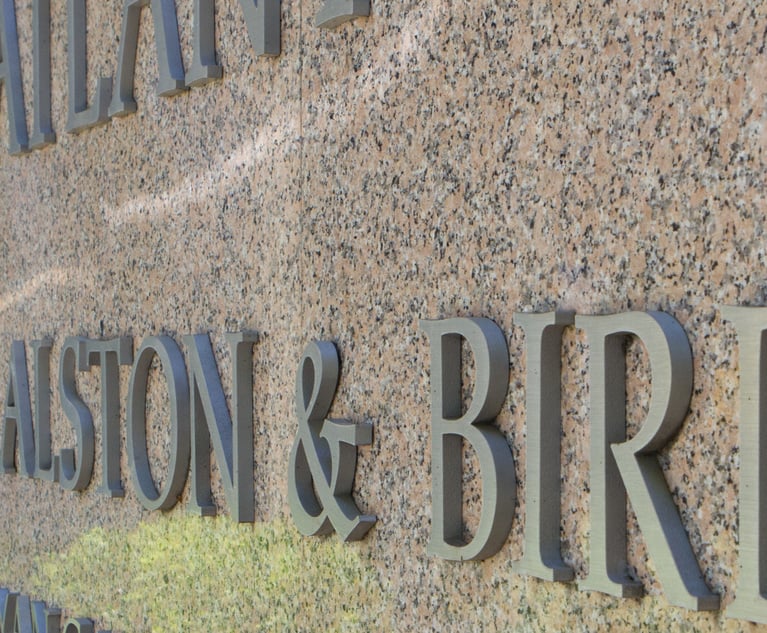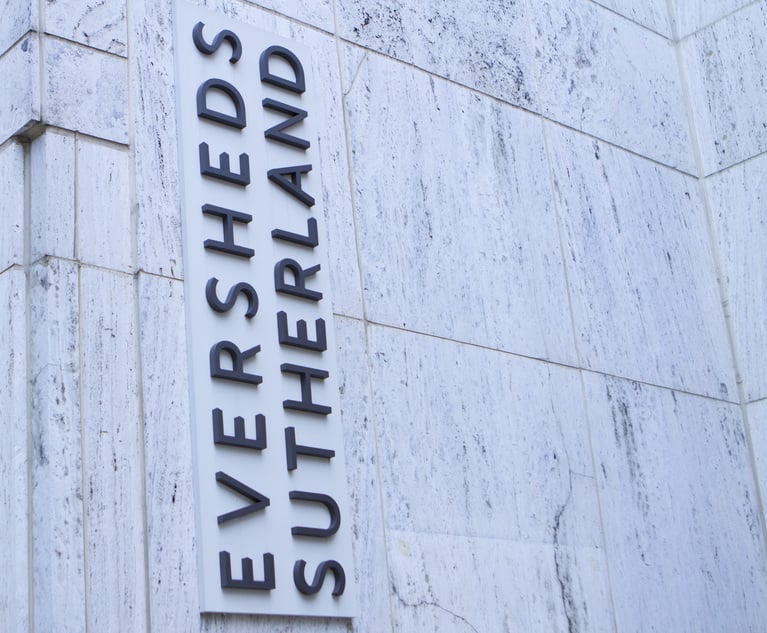 Lili Hester (from left), Jazmin Carswell, Abby Hellmann, Sarah Gabriel and Emma McConnell were a team of New Media Institute students who created a website to help Athens-area residents navigate civil law when they can't afford an attorney.
Lili Hester (from left), Jazmin Carswell, Abby Hellmann, Sarah Gabriel and Emma McConnell were a team of New Media Institute students who created a website to help Athens-area residents navigate civil law when they can't afford an attorney.New Workers Step in to Fill Access to Justice Gap
"These students are super bright and committed. They picked up the challenges pretty quickly," said UGA law associate dean and Athens Access to Justice co-founder Eleanor Lanier. "I thought of them as consultants who have information and expertise."
February 28, 2020 at 03:54 PM
4 minute read
Help for people who have to represent themselves in civil matters has taken on a new look, and it's not a suit.
Students at the University of Georgia—working with professors and Athens area volunteer lawyers—launched a website this month to help pro se litigants learn the terms and find the forms they need. The website complements a legal clinic in the courthouse—and popup clinics in the community—teaching a do-it-yourself approach to addressing needs such as protective orders, divorce, child support and establishing parental rights and responsibilities, the university said in an announcement.
It's the kind of solution Georgia Supreme Court Chief Justice Harold Melton called for in his annual State of the Judiciary address at the Capitol Wednesday.
"We must continue to do better to ensure that all Georgians—rich and poor—have access to justice," Melton said. He noted it was six years ago in the same annual address when then-Chief Justice Hugh Thompson pronounced that Georgia's judicial system was "sound and strong … for those who can afford a lawyer."
Thomson pointed to the growing number of rural counties with no—or only a few—lawyers. That gap has only grown in the years since, despite the State Bar of Georgia's repeated efforts to address it.
"Today, the number of self-represented Georgians coming to our courts has reached well over 1 million," Melton said. "They include the mom-and-pop grocery store owner with a contract dispute, the father dying from cancer who must finalize guardianship for his young children, our wounded warriors returning from battle who can't access the disability benefits our government has promised, and our elderly citizens, who have numerous legal needs, including the fundamental need to protect their own safety and health."
The trend leads to poorer success rate for the individuals and headaches for the court, he noted.
"When people represent themselves, their unfamiliarity with the law and court procedures often results in frustration for all involved, rescheduled and protracted hearings, and other inefficiencies that consume valuable state and local resources," Melton said. "Our legal system is an adversarial system; people win and lose. Citizens who represent themselves, more often lose."
Efforts to encourage more lawyers to locate in rural areas with fewer economic opportunities failed flat. Legislation to offer law school tuition pay back never made it to the floor for a vote. The best solution those who've studied the problem have offered is do-it-yourself help—increasingly made possible by technology.
Melton said he will appoint a committee led by judges to "explore and promote best practices for refashioning law libraries across the state to meet today's needs." He pointed to self-help resource centers such as the ones court law librarians have created in Fulton and Dougherty counties. He offered a vision of existing and underused law libraries as "a place where citizens will gain greater access to our legal system."
The same need led a group of University of Georgia students to partner with the volunteer organization Athens Access to Justice to offer technology-based solutions. The students worked through a semesterlong capstone project in the New Media Institute, part of Grady College of Journalism and Mass Communication.
John Weatherford of the new media faculty guided the team, working with University of Georgia School of Law Associate Dean Eleanor Lanier. Lanier is co-founder of Athens Access to Justice. Lanier leads clinical programs for the law school and co-founded the volunteer lawyers group called Athens Access to Justice. She was quoted in the university's announcement about building the new website.
"These students are super bright and committed. They picked up the challenges pretty quickly," Lanier said. "I thought of them as consultants who have information and expertise. The fact that they were learning at the same time is great."
The resulting work can be seen on the website athensaccesstojustice.org.
This content has been archived. It is available through our partners, LexisNexis® and Bloomberg Law.
To view this content, please continue to their sites.
Not a Lexis Subscriber?
Subscribe Now
Not a Bloomberg Law Subscriber?
Subscribe Now
NOT FOR REPRINT
© 2024 ALM Global, LLC, All Rights Reserved. Request academic re-use from www.copyright.com. All other uses, submit a request to [email protected]. For more information visit Asset & Logo Licensing.
You Might Like
View All

'Fulfilled Her Purpose on the Court': Presiding Judge M. Yvette Miller Is 'Ready for a New Challenge'
8 minute read

Trending Stories
Who Got The Work
Michael G. Bongiorno, Andrew Scott Dulberg and Elizabeth E. Driscoll from Wilmer Cutler Pickering Hale and Dorr have stepped in to represent Symbotic Inc., an A.I.-enabled technology platform that focuses on increasing supply chain efficiency, and other defendants in a pending shareholder derivative lawsuit. The case, filed Oct. 2 in Massachusetts District Court by the Brown Law Firm on behalf of Stephen Austen, accuses certain officers and directors of misleading investors in regard to Symbotic's potential for margin growth by failing to disclose that the company was not equipped to timely deploy its systems or manage expenses through project delays. The case, assigned to U.S. District Judge Nathaniel M. Gorton, is 1:24-cv-12522, Austen v. Cohen et al.
Who Got The Work
Edmund Polubinski and Marie Killmond of Davis Polk & Wardwell have entered appearances for data platform software development company MongoDB and other defendants in a pending shareholder derivative lawsuit. The action, filed Oct. 7 in New York Southern District Court by the Brown Law Firm, accuses the company's directors and/or officers of falsely expressing confidence in the company’s restructuring of its sales incentive plan and downplaying the severity of decreases in its upfront commitments. The case is 1:24-cv-07594, Roy v. Ittycheria et al.
Who Got The Work
Amy O. Bruchs and Kurt F. Ellison of Michael Best & Friedrich have entered appearances for Epic Systems Corp. in a pending employment discrimination lawsuit. The suit was filed Sept. 7 in Wisconsin Western District Court by Levine Eisberner LLC and Siri & Glimstad on behalf of a project manager who claims that he was wrongfully terminated after applying for a religious exemption to the defendant's COVID-19 vaccine mandate. The case, assigned to U.S. Magistrate Judge Anita Marie Boor, is 3:24-cv-00630, Secker, Nathan v. Epic Systems Corporation.
Who Got The Work
David X. Sullivan, Thomas J. Finn and Gregory A. Hall from McCarter & English have entered appearances for Sunrun Installation Services in a pending civil rights lawsuit. The complaint was filed Sept. 4 in Connecticut District Court by attorney Robert M. Berke on behalf of former employee George Edward Steins, who was arrested and charged with employing an unregistered home improvement salesperson. The complaint alleges that had Sunrun informed the Connecticut Department of Consumer Protection that the plaintiff's employment had ended in 2017 and that he no longer held Sunrun's home improvement contractor license, he would not have been hit with charges, which were dismissed in May 2024. The case, assigned to U.S. District Judge Jeffrey A. Meyer, is 3:24-cv-01423, Steins v. Sunrun, Inc. et al.
Who Got The Work
Greenberg Traurig shareholder Joshua L. Raskin has entered an appearance for boohoo.com UK Ltd. in a pending patent infringement lawsuit. The suit, filed Sept. 3 in Texas Eastern District Court by Rozier Hardt McDonough on behalf of Alto Dynamics, asserts five patents related to an online shopping platform. The case, assigned to U.S. District Judge Rodney Gilstrap, is 2:24-cv-00719, Alto Dynamics, LLC v. boohoo.com UK Limited.
Featured Firms
Law Offices of Gary Martin Hays & Associates, P.C.
(470) 294-1674
Law Offices of Mark E. Salomone
(857) 444-6468
Smith & Hassler
(713) 739-1250






